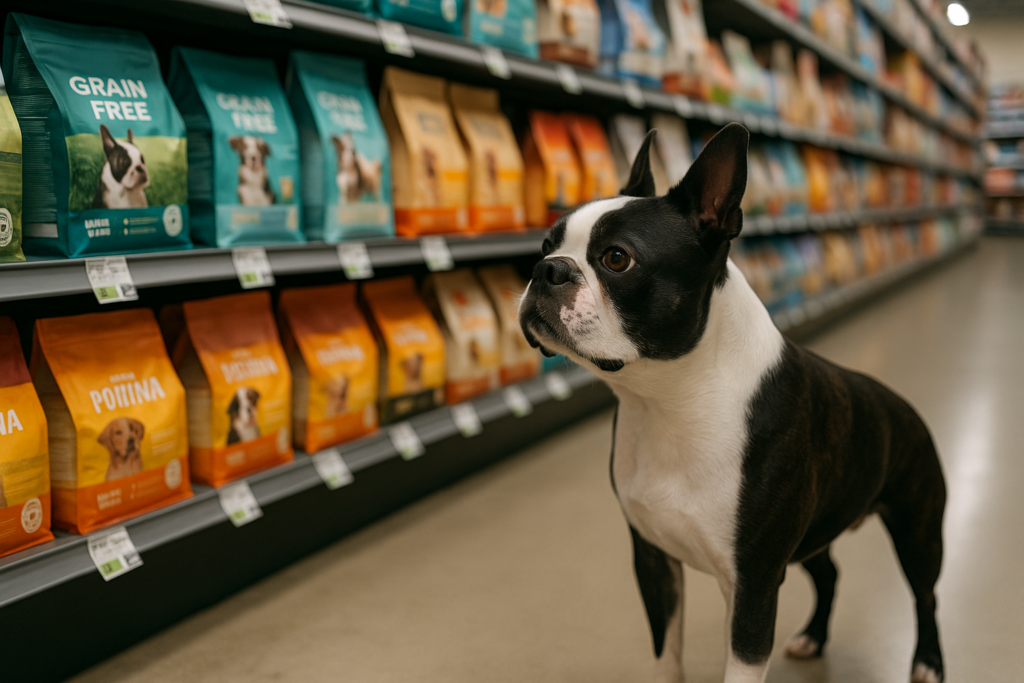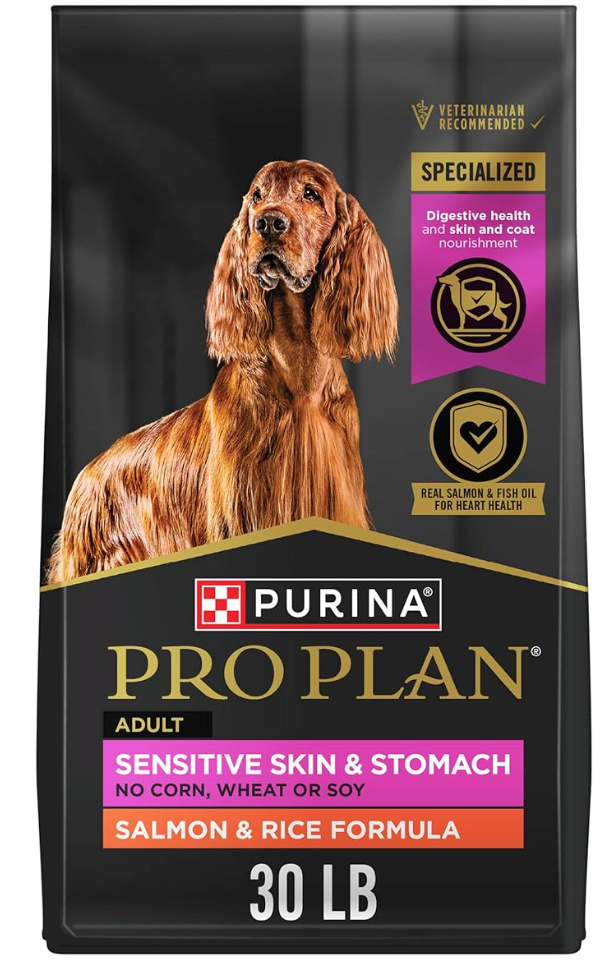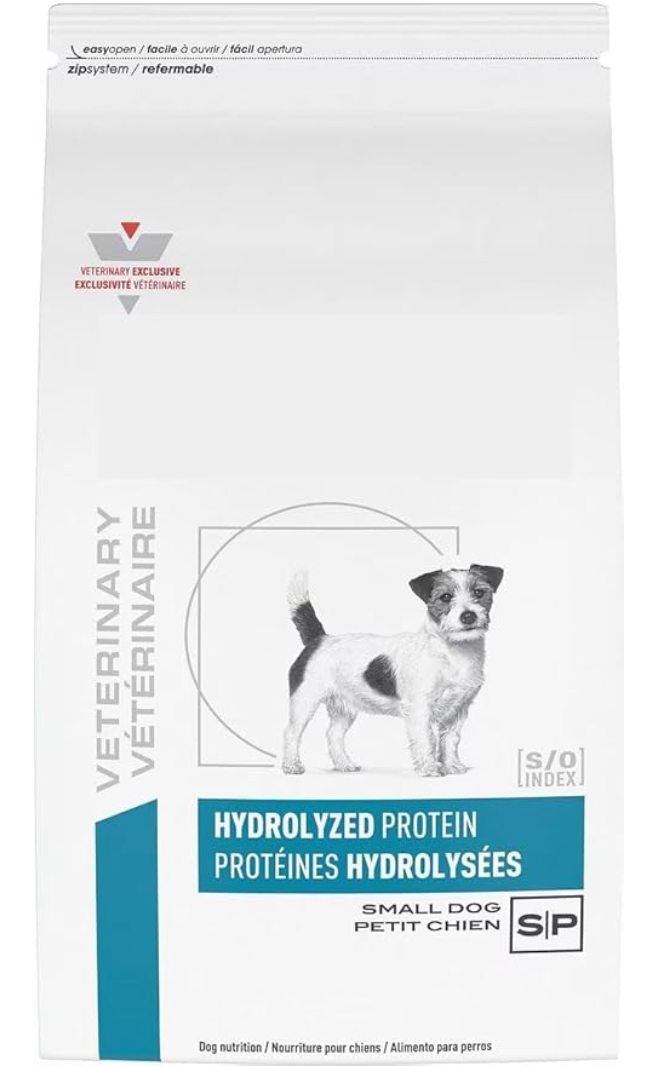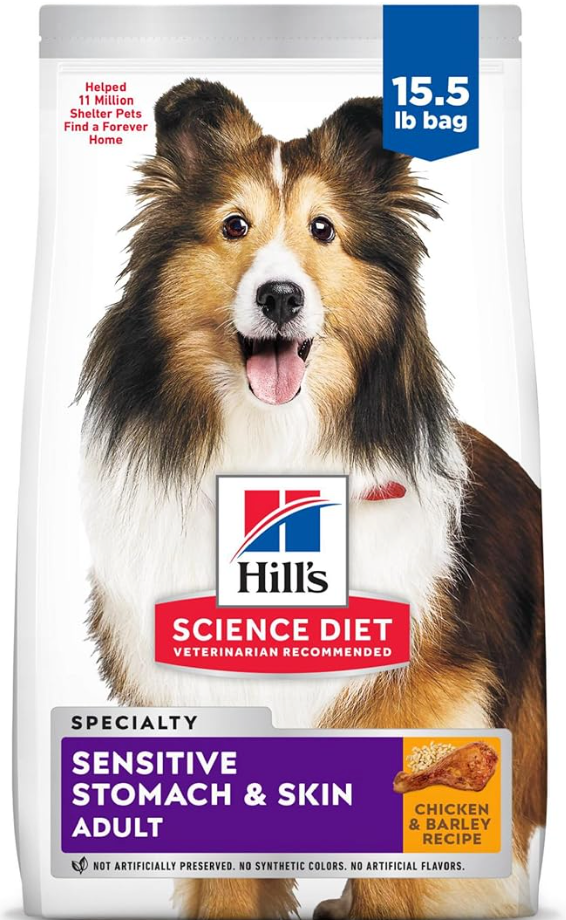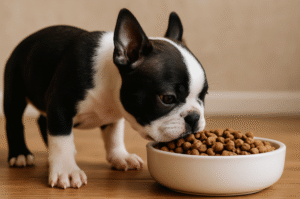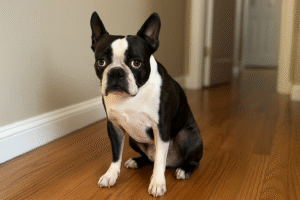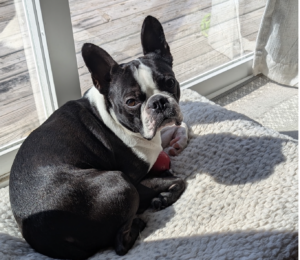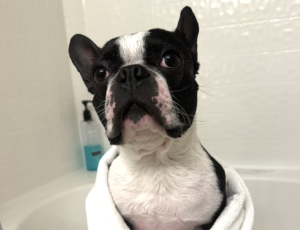Hello fellow Boston Terrier lovers — and overthinkers like me who stand in the dog food aisle for far too long, comparing every label!
If you’ve ever found yourself tangled in the debate of grain vs. grain-free food for Boston Terriers, you’re not alone.
Is it better for Boston Terriers to have grain or grain-free?
Let’s push past all the marketing fluff and uncover the real science, heartfelt expert opinions, and a few personal lessons I’ve learned from my mischievous Boston, Dumpling.
Why Is This Question So Popular Among Dog Owners?
It’s hard not to be swayed. Over the past decade, grain-free foods stormed the market, pitched as “ancestral diets” — more like what wolves would have eaten.
Pet food brands splashed words like “primal”,“pure”, and “wild” across bags, making grains sound like a sinister intruder. Naturally, that sparked countless questions about allergies, upset tummies, and whether our Boston Terriers are suffering in silence.
“Many pet owners believe grain-free is healthier, but this isn’t always the case.”
— Dr. Jerry Klein, Chief Veterinary Officer, American Kennel Club
His gentle reminder cuts through the noise: what sounds glamorous isn’t always grounded in truth.
Digestive and Allergy Concerns in Boston Terriers
Boston Terriers are famously adorable — and famously gassy. They’re prone to delicate stomachs, skin woes, and allergies that can turn peaceful nights into endless scratching.
No wonder people rush to ask:
“Are Boston Terriers allergic to grains?”
“What The Best dog food for Boston Terriers with gas?”
“What The Best dog food for Boston Terriers with skin allergies?”
The surprising reality? True grain allergies are quite rare. Most Boston Terrier allergies trace back to proteins like chicken, beef, or dairy. According to multiple veterinary nutrition studies, grains are actually among the least common triggers.
That’s a huge relief, because unnecessarily cutting grains might rob your Boston of valuable fiber and nutrients.
What Do Scientific Studies and Veterinarians Say?
This is where emotions meet cold, sobering facts.
FDA & the Dilated Cardiomyopathy (DCM) Concern
In 2018, the FDA began investigating a disturbing spike in cases of Dilated Cardiomyopathy (DCM) — a potentially deadly heart condition. Over 90% of these cases involved grain-free diets.
But here’s the twist:
It wasn’t the absence of grains. It was the massive amounts of peas, lentils, chickpeas, and potatoes many grain-free foods used instead.
What top vets uncovered
Dr. Lisa Freeman from Tufts University, a respected vet nutritionist, explained:
“The apparent link between BEG diets and DCM may be due to ingredients used to replace grains… such as lentils or chickpeas.”
These aren’t empty opinions. Her research helped guide the FDA’s own warnings.
New data: No universal danger
Later, a thorough study by BSM Partners and the University of Missouri found:
- Properly formulated grain-free diets didn’t change heart function in dogs over 7 months.
- Reviewing 68,000 cases showed no spike in DCM simply because grain-free sales surged.
The ultimate takeaway?
Grain-free isn’t evil, grains aren’t magic. It’s about balanced, thoughtfully crafted recipes, not trendy labels.
Pros and Cons of Grain-Inclusive Dog Food
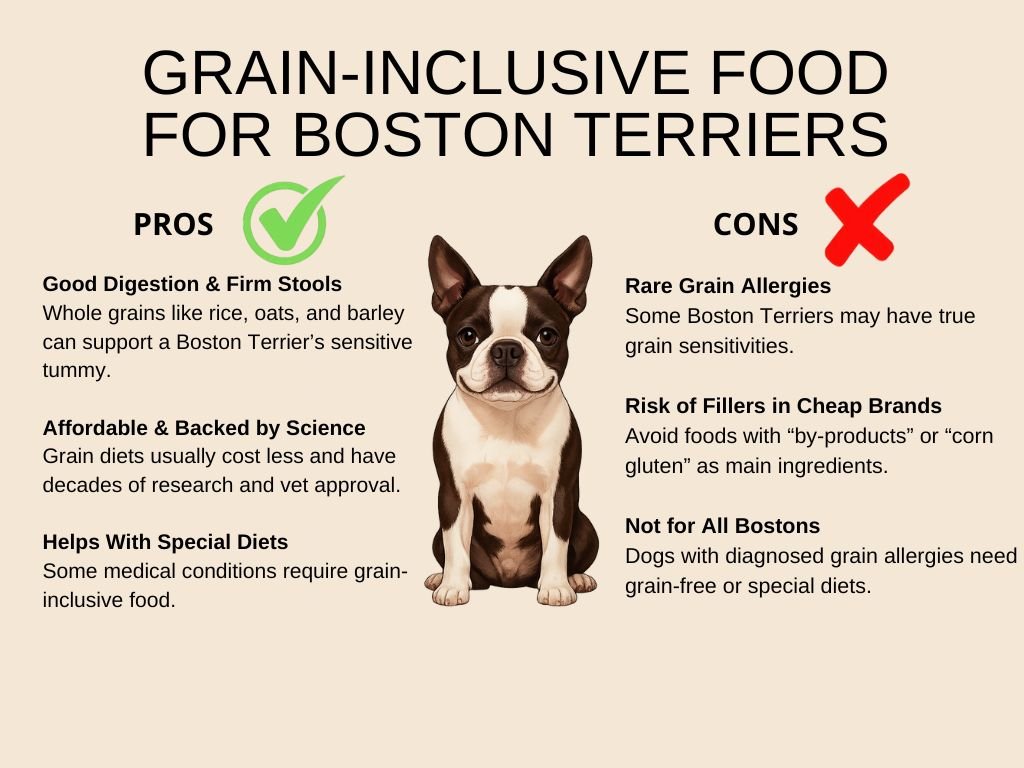
Pros of grain-inclusive dog food:
Wholesome grains like brown rice and oats supply Boston Terriers with slow-burning carbohydrates, keeping them playful and peppy.
Grains are rich in natural fiber, helping regulate digestion and minimize that notorious Boston Terrier flatulence — something every owner secretly hopes for.
Despite all the fearful chatter, grains rarely cause food allergies. Proteins are far more common culprits, meaning grains are usually a safe, proven choice.
Many grain-inclusive brands (like Purina Pro Plan and Hill’s Science Diet) are time-honored, backed by robust feeding trials and veterinary endorsements.
As Dr. Jerry Klein reminds us:
“For most dogs, there is no medical indication for a grain-free diet.”
Cons of grain-inclusive dog food:
In rare cases, a Boston may have a genuine grain allergy, leading to relentless itching, ear infections, or miserable digestive woes.
Cheap foods sometimes use questionable “cereal byproducts.” It’s vital to see honest grains like “brown rice” or “oat groats” rather than cryptic blends.
Pros and Cons of Grain-Free Dog Food
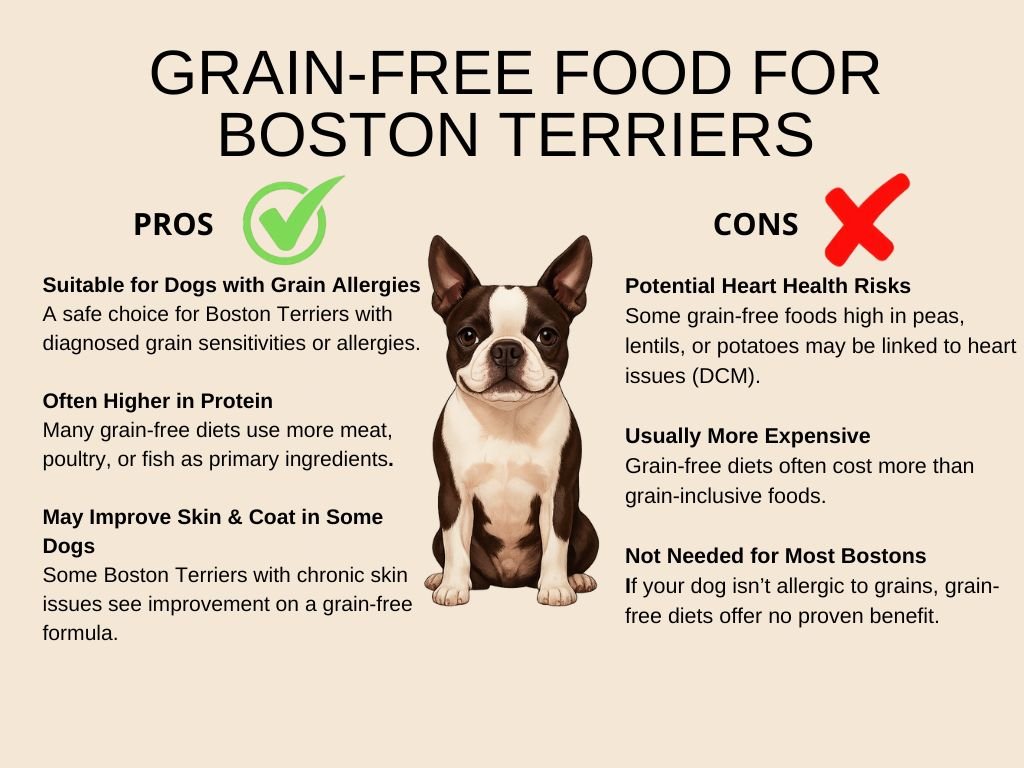
Pros of grain-free dog food:
For Boston Terriers truly allergic to grains, grain-free diets can bring dramatic relief from itching, upset stomach, and chronic ear infections.
Many grain-free formulas feature more meat, fish, or poultry, which can help support lean muscle and satisfy picky eaters.
Certain Boston Terriers with recurring skin troubles or dull coats may improve when switched to a well-formulated grain-free diet.
Grain-free foods sometimes come in exotic flavors and limited-ingredient recipes, which can be a blessing for Bostons with multiple food sensitivities.
Cons of grain-free dog food:
The vast majority of Boston Terriers tolerate grains just fine. Going grain-free without a diagnosed allergy often brings no extra benefit—and sometimes extra risk.
Some grain-free diets heavy in peas, lentils, or potatoes have been linked to a rare heart condition (dilated cardiomyopathy) in some dogs. The science is evolving, but it’s a real concern.
Grain-free dog food can cost noticeably more—without always offering added value for healthy Bostons.
Some grain-free brands swap grains for cheap fillers like pea protein or potato starch, so it’s vital to read every label and choose trusted manufacturers.
Grain vs. Grain-Free: Ultimate Cheat Sheet
| Type of Dog Food | Possible Problems | Heart Risks | Who It’s Best For |
|---|---|---|---|
| Grain-Inclusive (rice, oats, barley, brown rice) | Rare food allergies; poor brands may use low-quality fillers | Extremely low; supported by decades of feeding trials | Most Boston Terriers; proven safe, especially for sensitive tummies |
| Grain-Free (no rice, oats, wheat) | Often replaces grains with peas, lentils, potatoes; watch for protein % | Potential risk if overloaded with legumes or starches; flagged by FDA | Dogs with confirmed grain allergies, need careful ingredient checks |
What Should Boston Terrier Owners Actually Do?
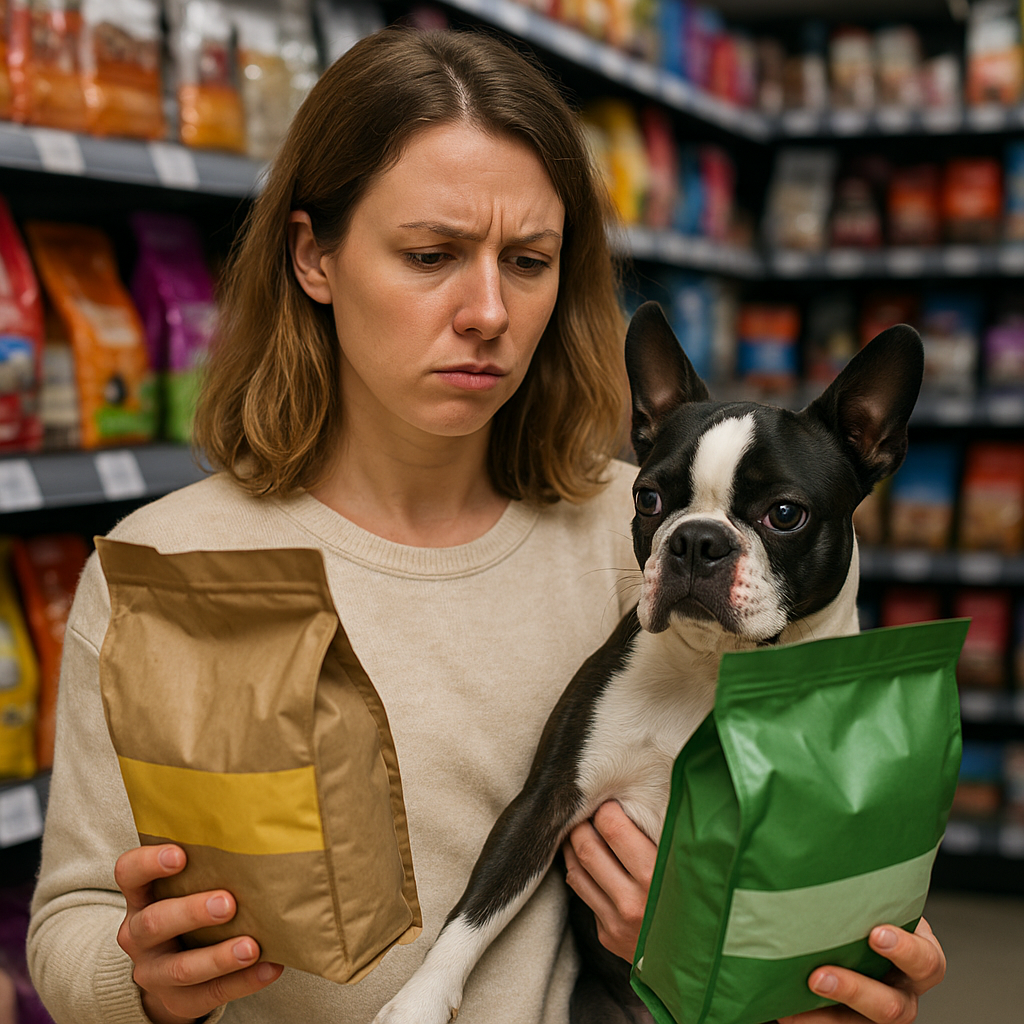
Here’s the comforting truth:
There is no one-size-fits-all answer. For most Boston Terriers, a high-quality grain-inclusive diet is the ultimate combination of safety, balance, and affordability.
If your pup starts itching or has tummy troubles, don’t panic and yank out grains immediately. Work with your vet, who might recommend an elimination diet to find the true trigger — often a specific meat protein.
Golden rule:
Meat should always be the first ingredient, grains (if present) should be whole and recognizable, and legumes should not dominate the list.
When Dumpling was a puppy, I thought I was doing him a huge favor by buying a fancy grain-free lamb formula. Within weeks, my cheerful clown turned into a bloated, gassy tornado, clearing the room faster than you could say “oops.”
Switching him to a well-made, grain-inclusive salmon & brown rice formula was a night-and-day transformation — less gas, shinier coat, and a sparkle back in his eyes.
That’s the kind of peace of mind every Boston parent craves.
Recommended Dog Foods for Boston Terriers
Best Grain-Inclusive Dog Foods
- Purina Pro Plan Sensitive Skin & Stomach (Salmon & Rice)
- Royal Canin Veterinary Hydrolyzed Protein HP Small Breed Dry Dog Food
- Hill’s Science Diet Adult Sensitive Stomach & Skin
Best Grain-Free Dog Foods (for special cases)
- Merrick Premium Grain Free Dry Adult Dog Food
- Wellness CORE Grain-Free Original
- Hill’s Science Diet Sensitive Stomach & Skin Grain Free Chicken & Potato Dry Dog Food
Frequently Asked Questions
-
Is grain-free wet dog food better for dogs?
The choice between wet and dry food is separate from the grain-free debate. Wet food is great for hydration and can be more palatable for picky eaters. However, a grain or grain-free wet food for Boston Terriers is only "better" if its formula is high-quality and nutritionally balanced. The same rules apply: check the ingredients for high meat content and avoid an over-reliance on legumes.
-
Are Boston Terriers allergic to grains?
It's possible, but very rare. It's much more likely for a Boston Terrier to have an allergy or sensitivity to a protein like chicken or beef.
-
How can I tell if my Boston Terrier is allergic to grains?
The symptoms are the same as any other food allergy:
Chronic itching, paw licking, and skin redness
Recurring ear infections
Digestive upset (gas, diarrhea, vomiting)
The only way to know for sure is to work with your vet on an elimination diet, where you feed a simple, novel diet for 8-12 weeks to see if symptoms resolve.
-
Why don't vets recommend grain-free dog food?
This is a key point of confusion. Vets aren't anti-grain-free; they are pro-science. They recommend foods from companies that conduct extensive research and feeding trials to prove their diets are safe and balanced (like Hill's, Royal Canin, and Purina). Many "boutique" grain-free brands have not undergone this level of scrutiny. Given the potential (though not definitively proven) link between certain formulations and heart disease, vets are cautious and will recommend a grain-free diet only when there's a clear medical need.


